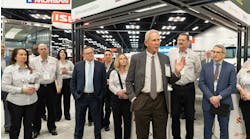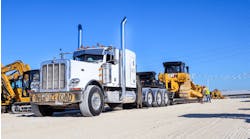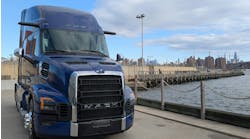An icon of the U.S. heavy-duty trucking industry in the 1980s passed away on March 19, 2006, in the German city of Wiesbaden. Peter Emil Rupp, who exerted a strong influence on how Class 8 trucks were built and sold while CEO of Freightliner Corp., died one month shy of his 76th birthday.
An Australian of German descent, Rupp took the helm of Freightliner in 1982, a year after DaimlerChrysler (formerly DaimlerBenz) bought the Portland, OR, OEM. At the time, the company commanded barely 8% of Class 8 sales in North America.
Freightliner's gradual ascent to industry leader began under Rupp and continued after his promotion to chairman of DaimlerBenz North America, a position from which he retired in 1990. At the helm of Freightliner, Rupp became a spokesperson for the industry For example, he was instrumental in re-introducing ABS brake systems on Class 8 trucks in North America.
Originally developed by Eaton Corp. in the 1970s, this important safety initiative found its demise when Congress recalled aggressive braking standards after several OEMs of Class 8 trucks sued for their recall. By 1986, Rupp got the ball rolling again in North America with Freightliner successfully testing a new ABS system.
Despite an invitation by Congress to testify to the safety, efficiency and applicability of the new systems, Rupp was adamant about letting the market decide on both application and timing of ABS on North American trucks. It took only a few years for most major fleets to recognize the ultimate savings that could offset the extra cost of ABS. This is but one example of Rupp's methods for prodding an entire industry into thinking safety and service.
Born in Munich and raised in Oelsnitz/Vogtland, Peter Rupp left Germany at age 18 and resettled with his parents in Australia, where he worked on his bachelor of commerce degree while working on the GM production line. He eventually joined GM's management ranks, then left to join VW where he worked himself up to managing director of Australia. In 1975, Rupp followed a call from DaimlerBenz, which named him CEO of Euclid Inc. in Cleveland in the late '70s.
Upon retiring from DaimlerChrysler in late 1990, Rupp settled in Wiesbaden and became an active participant in politics and economic restoration of the Eastern provinces following the country's re-unification in October 1990.
Rupp was on the board of the Treuhand Gesellschaft, a government agency founded to help former East German companies gain an economic foothold in the European and world markets. In that capacity, Rupp helped his home city of Oelsnitz significantly in bringing in new business opportunities. The city made him an honorary citizen and Rupp was buried there on March 29, 2006.
Aside from his accomplishments as a businessman throughout his long career spanning several continents, Rupp's legacy will be strongest for those whose lives he touched as a friend, boss or even a competitor. To all, he was known for his clear thinking, his decisiveness and his basic humanity. While working in and with the industry for nearly eight years, Peter became known, affectionately, as being more American than Apple Pie. He was proud of that distinction.
(Ursel Dougherty joined Freightliner in 1984 as Director of Public Affairs reporting to Peter Rupp. In 1988 as vp, Chairman's Office, she worked with Rupp in his capacity as Chairman, DaimlerBenz of North America. she joined the Penske Corp. in 1990 as vp.)


